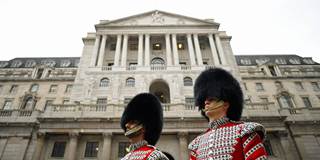Today, central banks are under attack for missing their inflation targets, failing to maintain financial stability or restore it in transparent ways, and ignoring the global repercussions of their policies. But compromising central bank independence in order to enhance political accountability would be to throw the baby out with the bathwater.
LONDON – On November 11, 1997, the Bank of England took a big step toward independence, courtesy of the second reading in the House of Commons of a bill amending the Bank Act of 1946. The bill gave legislative affirmation to the decision, taken by then-Chancellor of the Exchequer Gordon Brown, to free central bank operations from governmental control. This was a landmark event for an institution that had been under the yoke of government for a half-century. It symbolized how the need for central bank independence had become conventional wisdom.
Now, however, this wisdom is being questioned, and not just in the United Kingdom. So long as inflation was the real and present danger, it made sense to delegate monetary policy to conservative central bankers insulated from pressure to finance government budget deficits. Today, in contrast, the problem is the opposite, namely the inability of central banks to raise inflation to target levels.
To achieve this, it is necessary for monetary and fiscal policymakers to work together, including by allowing the central bank, in extremis, to monetize budget deficits. But when it comes to cooperating with the fiscal authorities, central bank independence is a hindrance, not a help.

LONDON – On November 11, 1997, the Bank of England took a big step toward independence, courtesy of the second reading in the House of Commons of a bill amending the Bank Act of 1946. The bill gave legislative affirmation to the decision, taken by then-Chancellor of the Exchequer Gordon Brown, to free central bank operations from governmental control. This was a landmark event for an institution that had been under the yoke of government for a half-century. It symbolized how the need for central bank independence had become conventional wisdom.
Now, however, this wisdom is being questioned, and not just in the United Kingdom. So long as inflation was the real and present danger, it made sense to delegate monetary policy to conservative central bankers insulated from pressure to finance government budget deficits. Today, in contrast, the problem is the opposite, namely the inability of central banks to raise inflation to target levels.
To achieve this, it is necessary for monetary and fiscal policymakers to work together, including by allowing the central bank, in extremis, to monetize budget deficits. But when it comes to cooperating with the fiscal authorities, central bank independence is a hindrance, not a help.